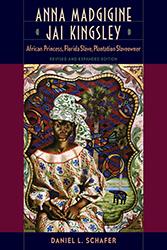Despite Florida’s current reputation as a swing state, there was a time when its Republicans were the underdogs against a Democratic powerhouse. This book tells the story of how the Republican Party of Florida became the influential force it is today.
Browse by Subject: History
Please note that while you may order forthcoming books at any time, they will not be available for shipment until shortly before publication date
The decision to consolidate with surrounding Duval County began the transformation of this conservative, Deep South, backwater city into a prosperous, mainstream metropolis.
This book collects previously unpublished letters written by a merchant in north Florida before the Civil War, offering a view of the region's transformation to a market economy due in part to its increased reliance on slavery.
Countering the conventional narrative that Florida’s tourism industry suffered during the Great Depression, this book shows that the 1930s were, in reality, the starting point for much that characterizes modern Florida’s tourism. David Nelson argues that state and federal government programs designed to reboot the economy during this decade are crucial to understanding the state today.
Through a wealth of unpublished and recently discovered images, this book presents new and rarely seen views of the people, places, and events involved in planning, accomplishing, and commemorating the first Moon landing.
Twenty-three leading historians offer a wealth of perspectives and expertise on the past 500 years in the Land of Sunshine.
Queering the Redneck Riviera recovers the forgotten and erased history of gay men and lesbians in north Florida, a region that has been overlooked in the story of the LGBTQ experience in the United States. Jerry Watkins reveals both the challenges these men and women faced in the years following World War II and the essential role they played in making the Emerald Coast a major tourist destination.
As stories about “Florida Man” inspire wild headlines in the news, Florida’s most beloved chronicler is here to show that the state is more than the stereotypes. Award-winning journalist Jeff Klinkenberg has explored what makes Florida unique for nearly half a century, and Son of Real Florida is a compelling retrospective of essays on the state he knows so well.
In this revised and expanded edition of Anna Kingsley’s remarkable life story, Daniel Schafer draws on new discoveries to prove true the longstanding rumors that Anna Madgigine Jai was originally a princess from the royal family of Jolof in Senegal. Captured from her homeland in 1806, she became first an American slave, later a slaveowner, and eventually a central figure in a free black community. Anna Kingsley’s story adds a dramatic chapter to the history of the South, the state of Florida, and the African diaspora.
Beginning with the state's colonial history, Florida's Other Courts challenges narratives that paint Spain's administration of its New World holdings as corrupt, inefficient, and tyrannical, using research into archival records scattered across Spain, Cuba, and other New World sites.











